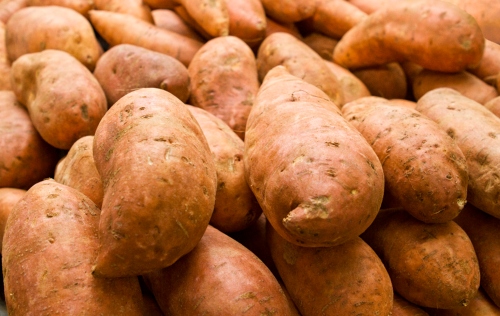The Inter-American Institute for Cooperation on Agriculture (IICA), along with its partners in academia and the private sector, is preparing the groundwork for the first sweet potato biofortification project in Jamaica.

Kingston, Jamaica (IICA). The Inter-American Institute for Cooperation on Agriculture (IICA), along with its partners in academia and the private sector, is preparing the groundwork for the first sweet potato biofortification project in Jamaica. This initiative is seeking to improve nutrition at the national level and would be the first of its kind in the English speaking Caribbean.
According to Dr. Elizabeth Johnson, IICA Representative in Jamaica, biofortification is an agriculture-based method to address micronutrient deficiencies through plant breeding. She explained at the inaugural workshop that biofortified crops could prove critical in addressing vitamin and mineral deficiencies, as part of a balanced diet, particularly in women and children.
Dr. Gillian Smith, in charge of the UN Food and Agriculture Organization (FAO) Office in Jamaica concurred. She commented that the initiative acquires even greater importance in light of increasing hidden hunger or nutrient poor diet and non-communicable diseases such as obesity, heart disease and Type II diabetes in the region. “This initiative will facilitate evidence-based action, using research and science to inform action and decision-making at the state level”, she explained.
The keynote presentation was delivered by Dr. Carolina Gonzalez, Deputy Director for Harvest Plus Latin America and the Caribbean. Harvest Plus is the global leader in biofortification, seeking to stamp out hidden hunger through breeding and distribution of biofortified nutritious crops, with higher concentrations of the micronutrients Iron, Zinc and Vitamin A. Biofortified crops are now grown and consumed in over 60 countries improving the lives of millions.
Since the early 1990s, the idea of selecting varieties with the natural ability to accumulate micronutrients and crossing these with other varieties for high yield, disease resistance and good flavour was developed and has been promoted by an economist called Howarth “Howdy” Bouis. He was awarded the 2016 World Food Prize for his achievements as a cofounder of Harvest Plus.
In addition to teaching farmers to grow these crops, biofortification also incorporates processes to demonstrate health benefits derived from consumption. This requires multidisciplinary teams of experts including plant breeders, nutrition and food technologists working together.
IICA is taking the lead to partner with Harvest Plus and Penn State University to foster partnerships in CARICOM to make biofortied crops available to the region. Dr. Donovan Stanberry, Permanent Secretary gave the endorsement of the Ministry of Industry Commerce Agriculture and Fisheries (MICAF) on the initiation of this effort in Jamaica. He also highlighted the impact of diet on the performance and productivity of a nation’s people and stressed the importance of research and availability of proper planting materials for use by farmers.
Forty participants from the Jamaican government, regional organizations, the private sector, research institutions and academia contributed to the preparation of a major proposal for funding to launch the initiative. As sweet potato is grown and consumed throughout the region, it is an appropriate entry point for biofortification and as such major constraints to the production of this crop and its impact on food security were also considered.
According to Representative Dr. Johnson, the region has yet to exploit the vast potential and varied uses of the sweet potato, which can be used to manufacture some 118 value added products including flour, drinks and snacks.
The initiative has attracted the attention of the prestigious Penn State University, a major research and training institution with campuses and facilities throughout Pennsylvania U.S.A who has partnered with IICA and co-chaired the workshop. This partnership will also enable the wider agricultural sector to benefit from the expertise, resources, academic and research facilities of that institution to further build capacity in CARICOM. Key project players will be Penn State’s faculty Dr. Mark Guiltinan, Professor of Plant Molecular Biology and Dr. Siela Maximova, Research Professor of Plant Biotechnology. Indeed, Dr. Guiltinan co-hosted the workshop, pointing out that for thousands of years breeders have placed primary emphasis on improving the yield of plants, while often failing to address the need to enhance nutritional value.
Other speakers at the workshop were Dr. Helen Asemoto, Director of, the Biotechnology Centre at the University of the West Indies; Patricia Thompson, Director of, Jamaica Island Nutrition Network; Sophia Grey, Acting Director of the School Feeding Unit at the Ministry of Education Youth and Culture and Carla Douglas, Senior Research Director at MICAF’s Research and Development Division Bodles.
Funding is being sought to bring the benefits of biofortified crops to CARICOM.
For more information contact:
Elizabeth Johnson, Representative – IICA Delegation in Jamaica











